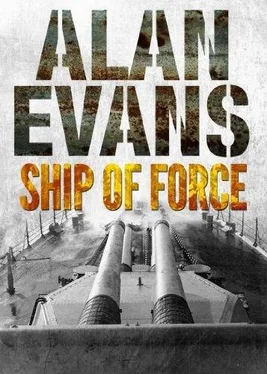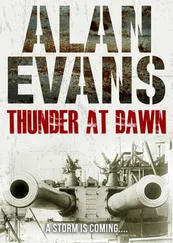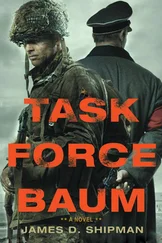He would be a fool to try it.
He found them all watching him as he came out of his abstraction, and Buckley in particular with a knowing look that vanished into blankness as Smith’s eyes found him. Smith snapped at him, at all of them. “What the hell are you all gawping at? Where do you think you are? Idling on the beach at Southend with a bag-full of winkles and a belly-full of beer? You’re supposed to be keeping a sharp look-out! You’re sitting right off a German shore!”
That set them looking about them.
And it had put off the decision.
Eleven minutes gone.
He glanced at Josef, feeling that he was being forced into this by a streak of soft sentimentality he had no right to possess, not as an officer in command, but he demanded, “You could take us there?” It was only just a question.
“To the guard-post?” The Belgian peered at him. “I could. But it would not be easy. There is barbed-wire strung all along the dunes and the Germans patrol the top. Every gap in the dunes is filled with wire strung like — like the web of a spider. There is a gun or a machine-gun every kilometre, sited to sweep the beach. Trenches are dug behind the dunes. When I made the signal to you I had to crawl into a gully so the men at the guns would not see the light. There are troops billeted or camped close to the trenches. If there was an attack alarm the trenches would be manned in minutes. A landing by troops would be very difficult, perhaps impossible. But one or two men, moving quietly and keeping away from the guns and patrols, that can be done. We did it last night. But when we get to the guardpost? There is a company —”
Smith broke in, his mind made up, “I know. Will you take us?” And as the Belgian hesitated, “Then will you draw me a map?”
Josef’s teeth showed in a wry grin. “A map would not get you through the dunes. But you’re determined to try. So. I will take you there.”
Smith asked, “You have a report to make?”
Josef made a rasping, derisive noise. “Whoever makes the report can tell Intelligence that Josef said: ‘No luck. Keep trying.’ It doesn’t matter. They’ll keep trying anyway.”
Smith looked at Lorimer. “Did you hear that?”
“Yes, sir.”
“Tell Mr. Dunbar. Now put us ashore.”
“Aye, aye, sir.” Lorimer’s tone was apprehensive. The boat turned in its length at his order and ran back towards the shore, the crew pulling eagerly now so Smith had to growl at them, “Easy!”
He went on talking to Lorimer. “I’ll take Buckley, McGraw, Galt and Finlay.” McGraw and Galt the toughs. Finlay he knew as a taciturn, competent seaman. He was glad he had brought the extra men — Lorimer would have just enough hands for the whaler, as it was.
“As soon as we’re ashore, run back on your course then lie by the buoy. When Sparrow comes she is to patrol as circumstances dictate but we will look to see her in —” He hesitated. A round trip of three kilometres but there might be delays. Delays ! He almost laughed at the word. “Two hours. Say at two-forty. Lie at the buoy and from two o’clock onwards you’ll run in to the shore and out again, watching for our signal. An ‘A’. Understood?”
“Yes, sir.”
But Smith still hesitated. The men’s faces were turned towards him, listening. He said, “You’ll have your hands full.” And Lorimer was young, raw.
Smith stared at one face, older, weather-beaten, and the man picked up his cue and said, “Maybe if I took the helm, sir, so Mr. Lorimer can watch his heading?”
He was an old hand, Smith knew, come back to the Navy from the fishing fleet, and he was privately telling Smith that he would look out for Lorimer. And himself, of course. Smith could read his mind: he didn’t want to pull around the North Sea all night while a green young squirt tried his hand at small boat navigation.
Smith nodded. “Do that.”
Buckley muttered, “Shore, sir.”
Josef was peering. He whispered, “That way!” And stuck out his left hand.
Smith hissed at Lorimer, “Ease to port!”
The helm went over and the whaler swung to port, crept on and crabbed in towards the shore as the men pulled slowly.
Josef whispered, “Here. The guns will not see us. We must risk the patrols.”
They swung to starboard, the men gave one last pull at the oars and the whaler ran into the surf once more. Smith strained his eyes against the darkness but saw only the pale stretch of the beach and the black lift of the dunes. Was a German patrol waiting for them up there? He could only bear the wash of the surf — then the whaler grounded. Smith and his little party tumbled out and Galt thrust at the bow of the whaler. It was backing off, turning, as they waded out of the sea and Smith led them at a trot up the beach, the big Webley revolver heavy in his hand. He ran crouching, expecting with every stride that the dunes would suddenly burst into the flash and rattle of rifle-fire. But then they were in the shadow of the wall of the dunes and he halted.
Josef looked about him, then pointed to his right. He led them now, along the wall of the dunes to where a gap like a gully cut in and upwards. He went on more slowly, a hand lifted cautioning, and Smith gestured the others into single file and followed on Josef’s heels. They passed the gully and saw it crisscrossed with a cat’s-cradle of barbed-wire. Just beyond the gully Josef began to climb the wall of the dunes using hands and toes. The wall was not so steep at that point. Smith followed him. As they came to the top the Belgian dropped on his knees, crawled to the summit then cautiously lifted his head. Smith could just see beyond him the posts marching away on either side with the barbed-wire strung between them. For a moment Josef knelt there, peering about him, then his hand lifted and he rose and led them on. They picked their way through the wire and beyond was a trench but it was no more than five feet wide and in turn they jumped it, crossed a track and followed the Belgian. Now they were winding through the dunes and after a minute or so he halted and turned to Smith.
“They patrol along the top of the dunes. You saw the track?” And as Smith nodded, “We were lucky. There will be other patrols but they keep to the road and the track. For most of the way we go —”
He stopped, searching again for a phrase and again Smith supplied it: “Across country.”
Josef nodded. “We go, yes?” He looked at Smith.
Smith pondered. They were ashore in enemy-held country; they were committed. And the woods at De Haan must be less than a kilometre away to the north…
He said, “Go on.”
Josef led on, the boots of all of them padding softly in the loose sand until they came out of the dunes. The ground beyond was open for a hundred yards but then a low shadow stretched across before them. Halfway across the open ground they came on a railway line, crossed its tracks and came to the shadow, that proved to be low scrub.
Smith whispered, “The railway. Where does it go?”
“Up to De Haan and on to Zeebrugge, or down through Ostende and right down the coast. The Germans use it, of course.”
Smith nodded and followed him again as they skirted the scrub, keeping close to its shadow. He noted the abandoned ruin of a cottage or barn, stored it in his memory as he was trying to count the paces, keep an idea of his bearings. The rain came again falling steadily. They moved through the silent country for a quarter-mile or so, Josef halting to peer about him and cock his head, listening. Then they left the scrub and he led them angling to the right and they came to a hedge. He followed it down to a gap, stepped cautiously through, head turning, and then waved them on. They came out on to a dirt road slippery with mud under the rain and the Belgian whispered, “Now we must go carefully. The village is close.”
Читать дальше












